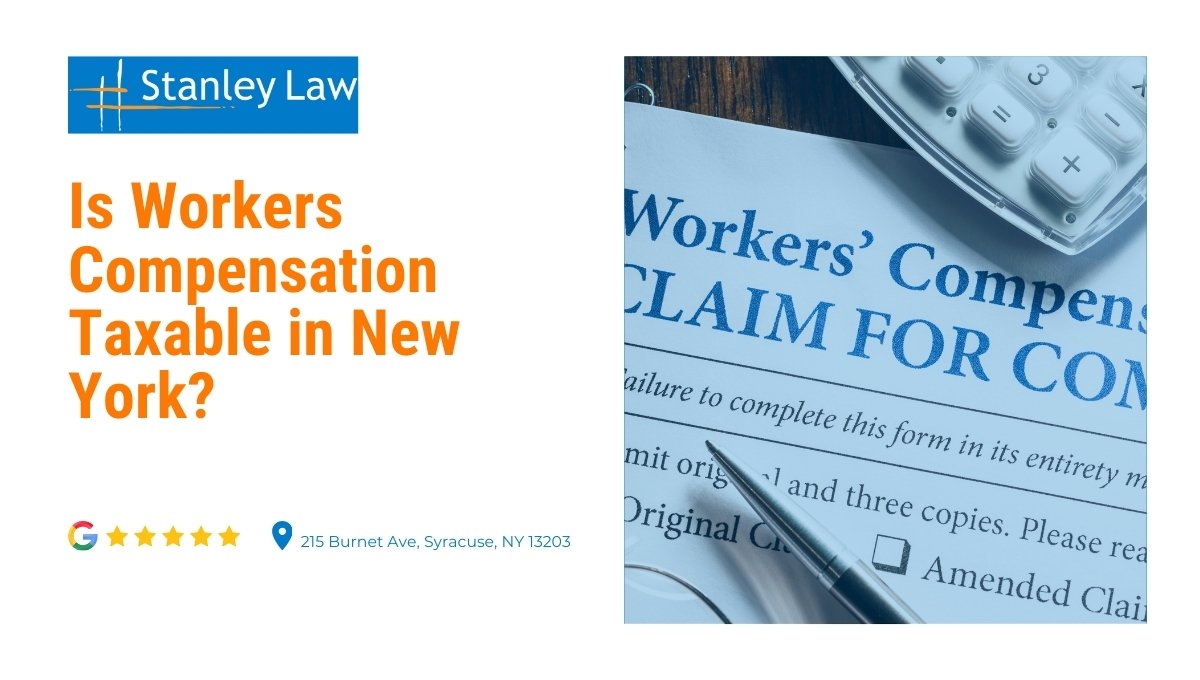If you’ve ever suffered an injury on the job, you know how stressful the recovery process can be, not only physically but financially, too. Between medical bills and lost wages, the last thing you want to worry about is taxes on your workers’ compensation benefits. A common question that usually comes up among injured employees is if workers’ compensation is taxable.
Workers’ compensation payments are, in most cases, not subject to taxation at either the federal or state level. However, certain situations may impact your workers’ compensation and ultimately affect your tax situation. In this article, we will break down when and how taxes may apply to your benefits so you can plan accordingly.
What is Workers’ Compensation?
Workers’ compensation is a mandated insurance program that provides financial assistance to employees who sustain injuries or fall ill while performing job-related duties. It aims to give injured employees access to financial support while they recover.
In exchange for the benefits, employees generally cannot sue their employer for negligence. However, an injured worker can sue for negligence where an employer intentionally caused harm or failed to carry the needed coverage.
How Workers’ Compensation Benefits Work
Here are the damages workers’ comp benefits cover:
- Medical Expenses: This includes doctor visits, hospital stays, surgeries, medications, and any other necessary treatments.
- Lost Wages: Covers partial wage replacement for employees who may not be able to work due to their injury.
- Rehabilitation Costs: This may cover physical therapy and vocational training for those who may need to transition to a new role. Employees who are in need of job retraining are required to apply through the New York State Education Department (ACCES-VR).
- Disability Benefits: Pays compensation for temporary or permanent disabilities that affect an employee’s ability to work.
- Death Benefits: Financial assistance to dependents if a workplace injury or illness leads to death.
Learn more about what does workers’ comp cover in our in-depth blog.

When Is Workers’ Compensation Taxable?
You are not required to pay tax from Workers’ compensation benefits either at the state or federal level. These payments do not need to be reported on your tax return and are exempt from income tax. However, there is one key exception:
If you qualify for workers’ compensation as well as Social Security Disability Insurance (SSDI), a portion of your SSDI benefits may be lowered due to the Social Security offset rule. In this case, the portion of SSDI benefits offset by workers’ compensation could become taxable.
Let’s take a closer look at how certain factors might affect your workers’ compensation taxation.
Social Security Disability Insurance
Some workers receive SSDI in addition to workers’ compensation. SSDI makes monthly payouts to individuals who cannot work because of a severe, long-term disability.
To qualify for SSDI, an individual must:
- Have actively worked in jobs covered by Social Security.
- Have a medical condition that meets the agency’s definition of disability.
When receiving both SSDI and workers’ compensation, total benefits cannot exceed 80% of the worker’s pre-injury earnings. If this cap is exceeded, the SSDI payments will be reduced, and the offset portion of SSDI may become taxable. However, the workers’ compensation benefits themselves remain tax-free.
Supplemental Security Income
Supplemental Security Income (SSI) is a federal program funded by U.S. Treasury general funds that provides financial assistance to individuals who are disabled, blind, or age 65 with limited income and resources. Like workers’ compensation, SSI payments are not taxable.
SSI Eligibility Requirements
Supplemental Security Income (SSI) is a separate federal program that provides financial assistance to disabled individuals who have insufficient income. Unlike SSDI, which is based on work history, SSI is a needs-based program.
SSI Eligibility Requirements:
- Must be disabled, blind, or at least 65 years old.
- Must have limited income and financial resources.
- Must be a U.S. citizen or meet certain immigration requirements.
- Must reside in the U.S.
Workers’ Compensation and SSI Eligibility
Workers’ compensation benefits are considered income. Because SSI eligibility is income-based, workers’ compensation payments can affect an individual’s SSI benefits. The more workers’ compensation settlement amount received, the lower the SSI payment may be. However, taxes are not deducted from SSI benefits. To confirm eligibility for both benefits, consult a NY workers’ compensation attorney.
Light-Duty Work and Taxes
Some injured employees return to work under light-duty restrictions, meaning they take on a modified role that accommodates their physical limitations. Here is how light-duty work can affect workers’ compensation payments:
- If the injured employee’s earnings are equal to or more than their pre-injury wages, they will stop receiving workers’ compensation wage replacement benefits.
- Partial workers’ compensation benefits may continue If they earn less than their pre-injury wages.
- Only wages earned from the job are taxable, as workers’ compensation benefits remain tax-free.
Retirement and Workers’ Compensation
Retirement is not expected to overshadow a workplace injury. Injured workers may continue to receive Workers’ comp even after retirement, although Social Security benefits may affect lost wages benefit.
How Workers’ Compensation and Retirement Work Together
Reaching retirement age can impact workers’ compensation payments, particularly regarding wage benefits. Here’s how:
- Medical benefits from workers’ compensation continue after retirement, covering injury-related healthcare costs.
- Lost wage payments may be reduced or stopped if the worker was receiving Social Security retirement benefits prior to the injury.
In New York, wage replacement benefits do not continue indefinitely for retirees.




Is Workers’ Comp Tax Deductible?
For employees, workers’ compensation benefits are not taxable, so there is nothing to deduct on a personal tax return. For businesses, however, workers’ compensation insurance premiums are tax deductible as an ordinary and necessary business expense. This helps employers offset the costs of providing coverage for workplace injuries.
If you have concerns about how workers’ compensation may affect your tax situation or need help filing a claim, it is ideal to consult an experienced NY workers’ comp attorney. A competent lawyer can help ensure you receive the benefits you’re entitled to.
Contact Stanley Law Offices today for expert legal assistance. Our team is committed to protecting your rights and helping secure the compensation you deserve. Call us at 800-608-3333.

Workers Compensation Taxation FAQs
Will I Receive a 1099 or W-2 For Workers’ Compensation?
No, you will not receive a 1099 or W-2 for workers’ compensation payments. Since these benefits are not taxable, they do not need to be reported to the IRS.
Are Workers’ Comp Benefits Taxable in the IRS?
No, workers’ compensation benefits are not taxable under IRS regulations. However, if you receive both workers’ compensation and SSDI benefits, a portion of your SSDI benefits may be subject to tax due to the Social Security offset rule.
What Employee Compensation is Taxable?
Taxable employee compensation includes regular wages, salaries, bonuses, commissions and tips, severance pay, stock options and restricted stock units (RSUs), non-accountable expense allowances, and certain employer-paid benefits, such as personal use of a company car.
What Kind of Income is not Taxable?
Examples of non-taxable income include workers’ compensation benefits, life insurance payouts, certain disability benefits, veterans’ benefits, child support payments, municipal bond interest, some social security benefits, and scholarships.
Do Employers Pay Workers’ Comp Tax?
Employers do not pay a direct tax for workers’ compensation. However, they are required to purchase workers’ compensation insurance to cover workplace injuries. Premiums are based on:
- The company’s payroll size.
- The industry’s risk level (higher-risk industries pay more).
- The business’s history of workers’ compensation claims.

